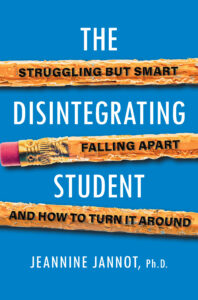THE DISINTEGRATING STUDENT by Dr. Jeannine Jannot (Book Excerpt)
 The Miraculous Transformation
The Miraculous Transformation
I have always been fascinated by the changes we see in our children as they grow; physically and psychologically. In what seems like the blink of an eye they go from infancy to adolescence, and the miraculous transformation starts the moment they are born. We revel in their first smiles, coos, and finger grasps. They are truly remarkable! They continue to amaze us with their unfolding development; eventually holding up their heads, rolling over, crawling, walking, and talking. Language and mobility are definite game changers to parenting, and we figure out how to fill our toddlers’ worlds with opportunities to learn and explore. With this new level of independence comes a new level of risk, and we establish boundaries and rules for safety and civility. “Don’t touch the stove.” “Say please when you ask for something.” This type of responsive parenting tends to come to us naturally, stemming from eons of evolution-shaped strategies to keep our kin (and species) connected and alive. Early on we integrate these developmental milestones into our parenting routines without much upheaval.
And then along comes adolescence, and everything changes. The middle school and high school years are rough, on kids and parents. Not only do our children experience outward physical changes, they also experience significant changes in their brains, marking fundamental shifts in how they learn, think, and act.
The physical changes are obvious. As they enter into puberty it is typical to see a “thickening” in our kids. Children who used to be mostly skin and bones will start to gain weight and their clothes will get tight on them. Then they’ll hit a growth spurt and the pudginess will turn into lean muscle. (And it’s probably time to buy another pair of shoes, too.) As a mom, I remember noticing this most when waking my kids up in the morning. I would go in and think: “Who is this adult size version of my child sleeping where my child should be?!”
The psychological changes our children experience during adolescence are equally dramatic. Prior to adolescence, your children likely considered you to be the center of their world. You were one of the smartest people they knew, and they looked to you for companionship, affection, support, advice, and instruction.
Unfortunately, when your child hits puberty you stop being the authority on everything, or their preferred source for information on anything. In fact, what you say often will be downright suspect. Instead of you, they begin to rely more heavily on their friends (and the internet) for information, advice, and opinions. What you think or feel does not mean nearly as much as it once did. As a parent, it can feel like your adolescent child thinks you to be the dumbest person on this or any other planet. If they are tempted to hear you out, they will surely check what you’ve said against what their friends at school think.
If these physical and psychological changes are big and significant to you, imagine how your child feels. It’s likely you remember. And you remember feeling like only your friends could possibly understand what you were going through. I sometimes think of adolescents as being like centaurs, the half-human/half-horse creature from Greek mythology, except adolescents are halfchild/half-adult. Of course, I also think of them as being like Dr. Jekyll and Mr. Hyde. You’ll know what I mean if you’ve ever had the experience of getting a warm hug one minute and then the next minute being told you’re the worst parent ever.
When your centaur exhibits this Jekyll/Hyde behavior—and they all do it sooner or later—keep in mind that its perfectly normal and driven by their stage of brain development and puberty, not a desire to break your heart.
It’s Not About Me
For a number of years, I’ve kept a sticky note prominently displayed on my bathroom mirror that says “It’s not about me.” It’s a reminder to myself that whenever I interact with my kids it helps to try, as best I can, to see things from their vantage point, not mine. I try to meet them where they are, not where I want them to be or think they should be.
There is no way to take emotions out of parenting, and sometimes we let our emotions get the best of us. As parents, we all make mistakes. We all say and do things that that we regret. Try as we might, it’s not possible for any of us to be perfect.
It is possible, however, for us to learn new things and to become better at parenting. The effort we put in and the changes we make do not go unnoticed or unappreciated by our kids. When we acknowledge to our children that we find something to be hard or challenging, that we are willing to learn from our mistakes, and that we are working to do our best, we are modeling a growth mindset. We are setting the stage for them to go out and face challenges and to learn from their own failures. This willingness to try and fail and learn and grow is, I believe, one of the most important aspects of successful parenting.
When dealing with adolescents it helps to see things from their perspective, and neurodevelopmental research from the past decade has shed light on how adolescents see things. One such finding is that teenagers tend to misinterpret facial expressions. Unlike adults, teens often interpret neutral, surprised, or fearful faces as being angry. Maybe you’ve had the experience of saying something to your teenager in a very matter-of-fact way and having them respond by yelling at you to stop being so mad. Once I understood this lovely little quirk of mental processing, instead of reacting defensively, I could channel the wisdom of my sticky note: “It’s not about me. It’s not about me. It’s not about me.”
I’m willing to bet you have a pretty good idea of what kind of mood your kids are in the minute they walk in the door and drop their backpacks. As parents, we’ve learned to read these nonverbal signals. What I’ve learned over time is how to use this knowledge to everyone’s advantage. If I have something pressing I need to ask them about, I’ll stop and take an emotional reading instead of hitting them with it the  minute they walk in. If it’s apparent my child feels emotionally raw or overwhelmed, I’ll hold back what I want to talk about until they are in a better frame of mind. Don’t be afraid to make that choice! It’s not a matter of being controlled by your child’s emotions, it’s just a matter of understanding how their brains work.
minute they walk in. If it’s apparent my child feels emotionally raw or overwhelmed, I’ll hold back what I want to talk about until they are in a better frame of mind. Don’t be afraid to make that choice! It’s not a matter of being controlled by your child’s emotions, it’s just a matter of understanding how their brains work.
Jeannine Jannot, Ph.D is an academic coach, founder of The Balanced Student, mother of three, and author of THE DISINTEGRATING STUDENT (August, 2021). She has over 25 years of experience working with children, teenagers and young adults in both public and private school settings spanning preschool through college. Dr. Jannot has a master’s degree in school psychology from The Ohio State University and a doctorate in child and developmental psychology from the University of Connecticut.
Tags: Child Development, college, dr. jeannine Jannot, having a family, jeannine jannot, parenting, raising kids, school, the balanced student, the disintegrating student















